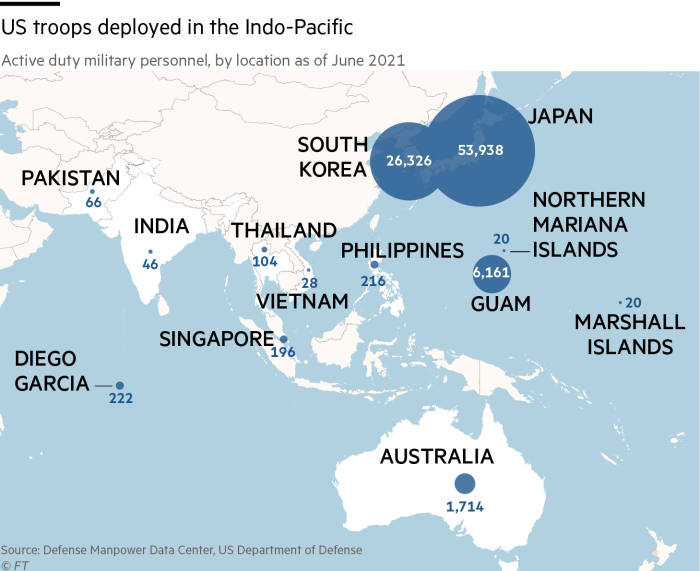US allies in Asia have drawn a distinction between President Joe Biden’s chaotic withdrawal from Afghanistan and Washington’s commitment to its partners in the region, rejecting claims that the pullout has undermined trust in America’s willingness to defend its friends.
Some commentators have predicted a collapse of US credibility in the wake of its botched exit and China has been quick to try to exploit the tumultuous events as a sign of American decline.
But government officials and defence experts from across the region have told the Financial Times that the comparison between Afghanistan and Washington’s relationship with the rest of Asia is misplaced.
Japan, which hosts the biggest contingent of US military forces in the region, believes the Biden administration’s willingness to co-operate on securing the Indo-Pacific and expand the role of the Quad, a grouping that includes India and Australia, shows the alliance is solid.
“The Biden administration has reaffirmed that [the mutual defence commitment] applies to the Senkaku Islands, applies in cyber attacks amounting to armed attack,” said a senior Japanese official, referring to islands in the East China Sea that are administered by Tokyo but claimed by Beijing.
In Australia, both the government and the opposition have stepped up their commitment to the US alliance.
“I don’t think that the end of America’s military campaign in Afghanistan is going to change that one way or the other or have any significant impact on the centrality of the alliance,” said Sam Roggeveen, director of the international security programme at the Lowy Institute, a Sydney-based think-tank.
He added that the US had gone into Afghanistan partly as a reaction to the dramatic images of the collapse of the Twin Towers in New York on September 11 2001. “The visuals out of Kabul now are similarly stark, and there is a certain overreaction again in the commentary,” he said.

Security experts said the US alliances would become even more critical in countering the threat from an increasingly assertive China, a stated aim of Biden’s decision to withdraw troops from Afghanistan. Kamala Harris, the US vice-president, used a long-planned visit to Singapore and Vietnam last week to reassure Washington’s partners in the face of threats from China.
“If the pullout from Afghanistan means that the US will be shifting its resources from the Middle East to east Asia, it’s not necessarily negative for Japan,” said Kazuhiro Maeshima, an expert on US politics at Sophia University in Tokyo.
Lieutenant General Chun In-Bum, a South Korean retired special forces commander, said those in the country who had close ties to the US armed forces retained “great trust” in the American military.
Still, the messy exit from Afghanistan has fuelled discussions over the need for US allies to do more in their security partnerships.
The Taiwanese government has stressed the need to be ready to fight if China realises its threat of attacking. Su Tseng-chang, the premier, said an important lesson should be drawn from Afghanistan that “nobody will help you unless you help yourself”.
For conservatives in Japan, who have pushed for a revision of the country’s pacifist constitution, developments in Afghanistan will strengthen their argument that the country should do more to protect itself.

“People who may have been overly dependent on the US may have been surprised, but my understanding is that President Biden stated the obvious. It’s normal that we need to protect our own country,” said Masahisa Sato, a parliamentarian who leads on foreign affairs for Japan’s ruling Liberal Democratic party.
Toshihiro Nakayama, a foreign policy expert at Keio University, said: “Through what happened in Afghanistan, I think there was a sense that the US-Japan alliance will not be sustainable unless Japan proactively raises its defence capability so it can ensure regional security together with the US.”
Some observers say Washington’s failure to achieve victory in Afghanistan could also cause allies to think twice before joining future US military campaigns. “The US might have more difficulty organising a coalition of the willing for military operations outside Europe and outside east Asia in the future,” said a senior official from an American ally.
In some countries, the Afghanistan pullout has inflamed political divisions. In Taiwan, which China threatens to invade if Taipei refuses unification indefinitely, opposition politicians have painted the US as an unreliable ally. “Events [like] in Afghanistan could likely happen in Taiwan”, said Jaw Shaw-kong, a fringe opposition figure.
The remark triggered fury from the ruling party, which has overseen the closest relations with the US since Washington shifted diplomatic recognition from Taipei to Beijing in 1979.
In South Korea, events in Afghanistan have fanned discord over the tens of thousands of US troops based in the country to defend against attacks from nuclear-armed North Korea and boosted calls from prominent ruling party politicians to boost military independence.
Opposition groups hit back, saying Kabul’s collapse highlighted both the need for stability in the US alliance and that South Korea should not rush moves to take operational control over the combined US-Korean forces.
But beyond such domestic politicking, experts dismiss a link between Washington’s alliances and its Afghanistan policy. The topic “may be intellectually interesting but not a real comparison”, said the Japanese official.
Reporting by Kathrin Hille in Taipei, Kana Inagaki and Robin Harding in Tokyo, Edward White and Kang Buseong in Seoul and John Reed in Bangkok
"Exit" - Google News
August 29, 2021 at 09:53AM
https://ift.tt/3jrH2lG
US’s Indo-Pacific allies maintain trust in Biden despite Afghanistan exit - Financial Times
"Exit" - Google News
https://ift.tt/2zNkU0N
https://ift.tt/2YrnuUx
Bagikan Berita Ini














0 Response to "US’s Indo-Pacific allies maintain trust in Biden despite Afghanistan exit - Financial Times"
Post a Comment